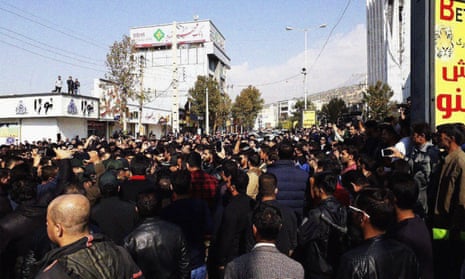Iranians accused of involvement in mass protests that gripped the country in November were hunted by authorities in the days and weeks after, with many disappeared, tortured and jailed, a human rights group has alleged.
Detainees including children were subjected to beatings, extreme temperatures, stress positions and electrocution, according to a report by Amnesty International, which said it had collected the names of more than 500 people investigated in connection with the protests. At least three have been sentenced to death so far.
Iran was convulsed with some of the largest demonstrations in its history from 16 November after the government’s surprise announcement of a fuel-price rise. At least 304 people and probably many more were killed by security forces over five days of unrest, with about 7,000 arrested, according to United Nations estimates.
Witnesses told the Guardian at the time that members of the Revolutionary Guards and police were raiding homes and hospital wards to arrest suspected demonstrators and quash what the country’s supreme leader, Ali Khamenei, had described as a “deep, vast and very dangerous conspiracy” concocted by Iran’s enemies abroad.
The Amnesty report, which was released on Wednesday, cited interviews with more than 70 people, reports to a hotline and video analysis to claim that authorities also raided workplaces and schools during and in the days after the protests to hunt down those allegedly involved.
They included Abolfazl Karimi, aged 17 at the time of the protests, who was detained on 18 November in Tehran province and recounted in a letter from prison that he was punched in the face and stomach and hit over the head with a gun as he was hooded and thrown into a van.
“He recalled that after beating him for about an hour the officials stopped and told him that if he ‘cooperated’ and ‘confessed’ to being in possession of a gun during the protests, the torture would stop,” Amnesty said. “They then bound his hands and feet and forced him to spend the night lying on a cold tiled floor.”
He has been convicted in two separate cases and sentenced to a year and a half and nine months in prison respectively. He denied the charges against him, saying he participated in the protests because of “the crisis that I faced due to Iran’s poor economic situation”.
“My expenses were greater than my income, and seeing my ailing mother and father suffer caused me pain … I joined the demonstrations to protest against the difficult conditions that I and the majority of people in my neighbourhood find ourselves in,” he wrote in the letter.
Iran’s economy has been suffocated by a US embargo imposed on the country after the Trump administration unilaterally abrogated an agreement to halt the Iranian nuclear programme in exchange for relief from sanctions. Tehran was in full compliance with the deal, according to UN inspectors.
Those targeted in the crackdown that followed the unrest included some who did not take part. A Kurdish film-maker, Mozhgan Kavousi, was arrested on 18 November in the central city of Noshahr in connection to Instagram posts she made about the demonstrations, the report said. She has been convicted of spreading propaganda and incitement and sentenced to six years in prison.
Amnesty said it also found evidence that people were held in secret facilities without access to lawyers, where many of those detained underwent torture and were made to record false confessions.
“Most frequently, victims recounted being hooded or blindfolded, punched, kicked, flogged, beaten with sticks, rubber hosepipes, batons and cables, suspended and/or forced into holding painful stress positions for prolonged periods, deprived of sufficient food and potable water, and placed in prolonged solitary confinement, sometimes for weeks or even months,” the report said.
The office of the Iranian president, Hassan Rouhani, declined to respond to the allegations in the report, Amnesty said.
